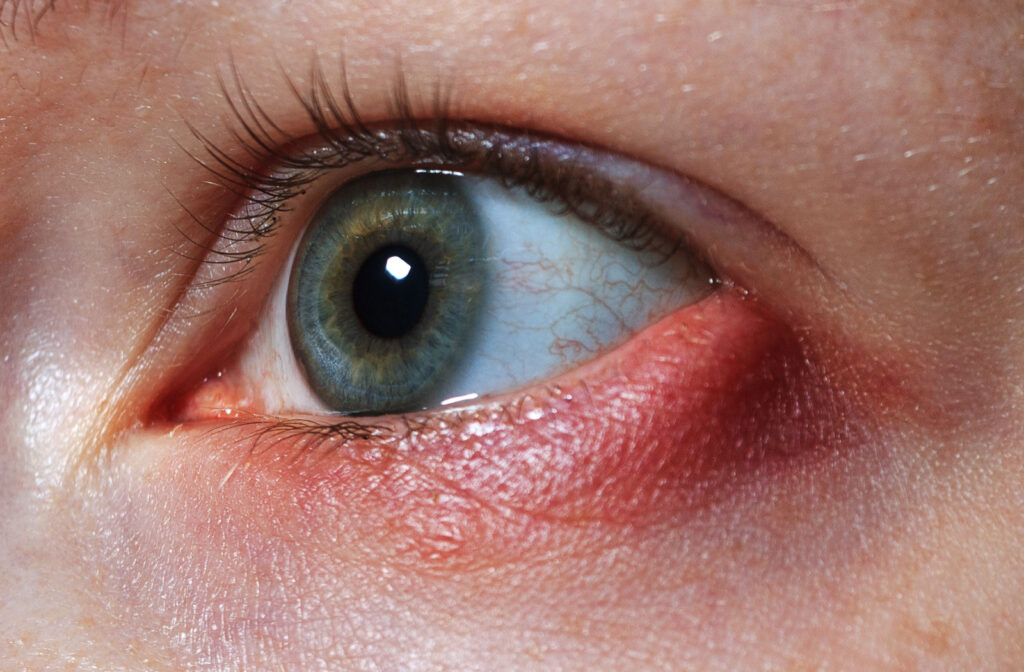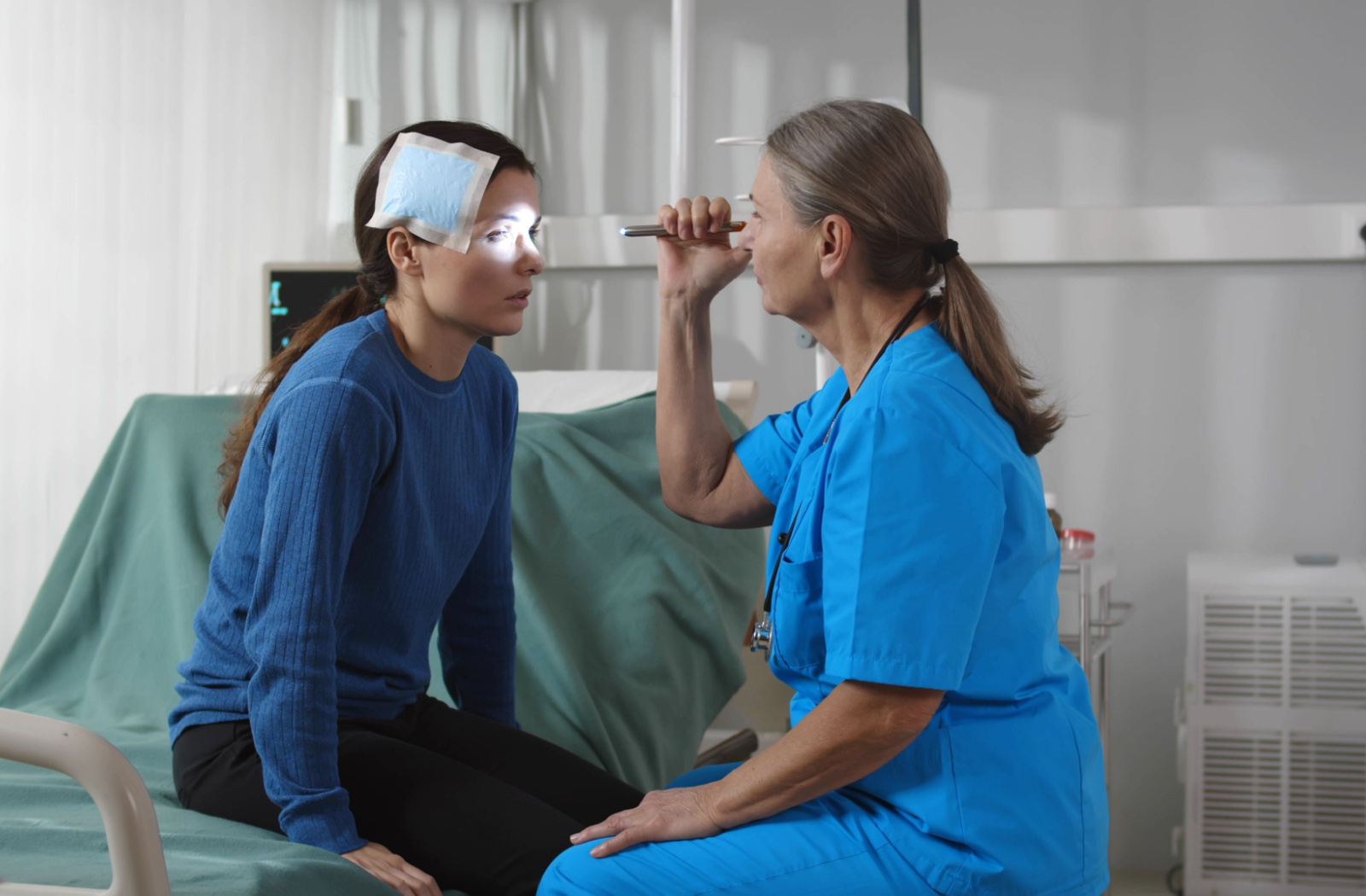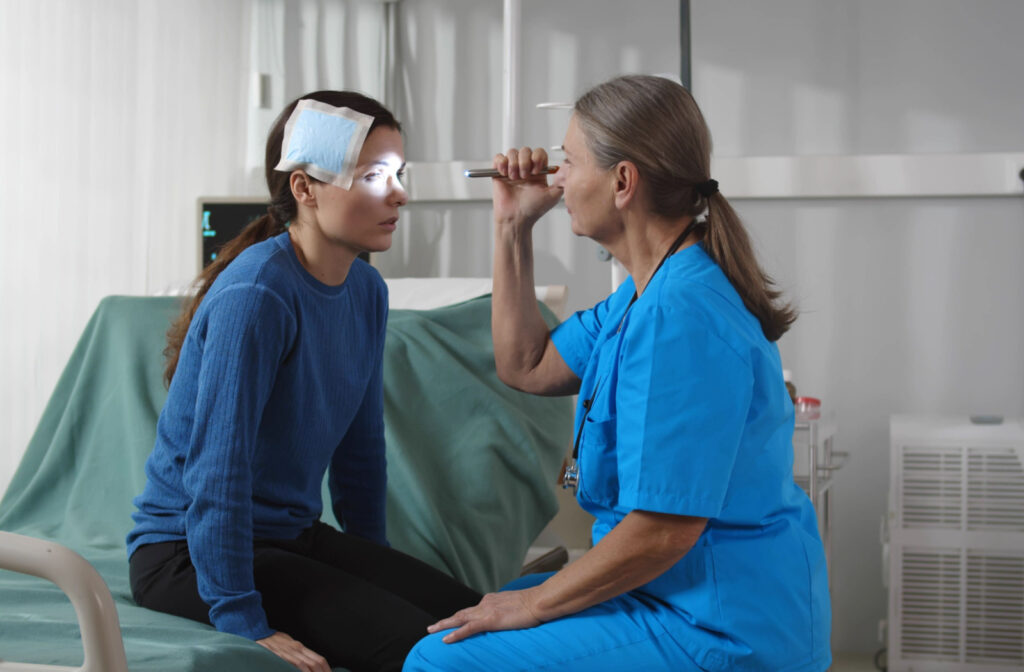Regarding eye issues, it can be hard to decide where to go. Should you see your family doctor or optometrist or go to an urgent care center?
If you have an eye issue, call your optometrist first. They have the equipment and training to assess your condition and determine if you need to see an ophthalmologist or go to the emergency room. Optometrists are the best initial point of contact for eye-related issues.
If you cannot see your optometrist or an ophthalmologist, going to urgent care or the emergency room is better than not being seen at all, especially if there’s a risk of vision loss.
What Counts as Urgent Emergency Eye Care?
Certain eye issues demand medical attention to protect your vision. These are considered emergencies, which means reaching out immediately to your optometrist for help, advice, or emergency eye care.
Any issues or symptoms that are out of the ordinary and cannot be explained should also be treated as emergencies. It’s always better to err on the side of caution when it comes to your vision and seek immediate medical attention if you have any doubts about your eye health. If you experience eye symptoms or issues, seek help as soon as possible.
Acute Closed-Angle Glaucoma
Acute closed-angle glaucoma is a serious condition where the fluid in your eye can’t drain properly, resulting in a sudden increase in eye pressure. Symptoms come on rapidly and can be severe. Acute closed-angle glaucoma can result in vision loss if not treated promptly.
Symptoms to watch for:
- Severe and sudden eye pain
- Headache
- Blurred vision
- Halos around lights
- Nausea
- Vomiting
Chemical Injuries
Chemicals can harm your eyes, whether solid, liquid, powder, or aerosol. Common chemicals include soaps, disinfectants, solvents, cosmetics, drain cleaners, oven cleaners, ammonia, and bleach.
Eye damage can occur within just 1–5 minutes, but most of the time, chemicals only cause surface damage without permanent vision loss. However, caustic (alkaline) chemicals are hazardous and can cause severe damage. Alkaline chemicals include ammonia, drain cleaners, automatic dishwashing detergents, and oven cleaners.
Symptoms to watch for:
- Eye redness
- Pain
- Watering
- Blurred vision
- Swelling
- Sensitivity to light
Corneal Abrasions
Corneal abrasions are scratches or cuts on the cornea, the clear front surface of the eye and can be caused by debris, contact lenses, or other items entering the eye.
In most cases, corneal abrasions heal quickly, but if they’re not treated, they can lead to infection or ulcers.
Symptoms to watch for:
- Eye pain
- Feeling like there’s something in the eye
- Redness
- Tearing
- Sensitivity to light
- Blurred vision
Eye Trauma
Eye trauma refers to any injury or damage to the eye caused by accidents, sports, or other traumatic events. Blunt trauma can lead to internal damage that’s not readily apparent, so it’s essential to seek help to receive care or rule out complications.
Symptoms to watch for:
- Eye pain
- Swelling
- Redness
- Bleeding
- Vision changes
- Difficulty moving the eye
Retinal Detachment
Retinal detachment is a vision-threatening condition where the retina, the light-sensitive tissue at the back of the eye, separates from its normal position. It requires early treatment to prevent vision loss.
There are many retinal detachment causes, but the most common are aging or eye injuries.
Symptoms to watch for:
- Sudden onset of floaters
- Flashes of light
- Dark curtain or shadow across vision
- Blurred or distorted vision
Severe Eye Infections
Severe eye infections can result from bacterial, viral, or fungal infections and can cause significant damage if left untreated.
Some eye infections aren’t serious and will clear up on their own. Other eye infections are emergencies and can lead to vision loss if not treated.
Symptoms to watch for:
- Eye redness
- Pain
- Discharge
- Swelling
- Sensitivity to light
- Blurred vision
Where to Get Emergency Eye Care

If you experience an eye emergency, call your optometrist. They have the knowledge, experience, training, and equipment to diagnose and treat your condition accurately. They will also be able to see you faster than an emergency room or urgent care center.
At Envision Eye Care, we’re here to help with any eye emergencies. If you or someone you know is experiencing an eye emergency, don’t hesitate to contact us, and we’ll accommodate you as soon as possible.
If our office is closed, please call 911 or visit your nearest emergency room.
How To Prevent Eye Injury
While some eye emergencies can occur without warning, you can take some steps to reduce your risk. These include:
- Wearing protective eyewear when engaging in activities that pose a threat to your eyes, such as sports or construction work.
- Avoiding rubbing or putting pressure on your eyes, as this can cause damage.
- Keeping sharp objects and chemicals out of reach, especially if you have young children in the house.
- Regularly visiting an eye doctor for check-ups to catch potential issues early on.
- Properly storing and using contact lenses according to your eye doctor’s instructions.
- Maintaining good eye hygiene, such as washing your hands before touching your eyes or contact lenses.
By following these tips, you can help protect and maintain your eye health. Remember, when it comes to eye care, prevention is always better than cure.
The Importance of Regular Eye Exams
Regular eye exams are crucial for maintaining good eye health, catching issues early like cataracts, glaucoma, or macular degeneration, and managing conditions like dry eyes and eye allergies.
Dry eyes occur when your eyes don’t produce enough tears or the right quality to keep them lubricated. An optometrist can diagnose this condition during an eye exam and recommend treatments to help you find some relief from uncomfortable dry eye symptoms.
Eye allergies can cause itching, redness, and excessive tearing. Your optometrist can help identify triggers and suggest management options like antihistamines or ointments.
Eye exams also allow for prescription updates for glasses or contact lenses, as prescriptions can change over time.
We recommend getting an eye exam every 2 years, or more frequently, if you have pre-existing eye conditions or a family history of eye diseases.
How Envision Eye Care Can Help with Emergency Eye Care
It’s important to know that you have options when you have eye problems. Envision Eye Care is here to help you with urgent or emergency eye care needs. We understand that eye issues can be serious and require immediate attention, and our goal is to work with you to protect your vision. Whether you need a routine eye exam or emergency eye care, Envision Eye Care is here to help. Contact us today to schedule an appointment and take the first step toward maintaining your eye health.



